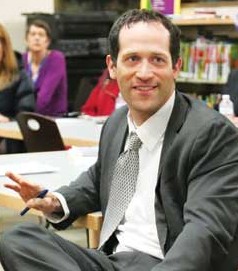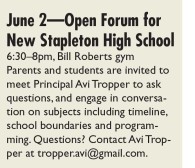
Stapleton high school principal Avi Tropper
The physical foundation has yet to be laid. The school name is not yet decided. The enrollment boundary system is still in the works, but the community has great expectations for the high school opening in August 2015. Tom Boasberg, superintendent of Denver Public Schools (DPS), champions Stapleton schools as “among the finest in the state” and “is fully confident that the new high school will continue this track record of exceptional quality.” David Suppes, chief operating officer of DPS, writes: “We expect this campus to become a shining star within DPS, providing rigorous academic programs and enrichment to enable the success of thousands of students for years to come.” The school’s principal, Avi Tropper, is similarly optimistic. He celebrates its potential to serve not only as a district and statewide exemplar, but to become a national model as well. Tropper envisions the school becoming a “model of students coming from all across Denver, from very different backgrounds” creating “a united community where students, and adults as well . . . build a culture, establish a sense of ownership and a desire to make the school succeed.” Tropper imagines all participants in the school community “supporting each other” and predicts “our graduates will go on and be amazingly successful adults—not only in the academic sphere, but as human beings and citizens too.”
The question now before Tropper, DPS and the Northeast Denver community is how do we establish the type of academic programming and cultural values to achieve such bold aspirations? Tropper has provided us with some initial answers in the school plan he recently submitted to the school board.
Although Principal Tropper has only been on the job for a few months, the contents of this plan have been in the works for years. Throughout his decade-long career as a teacher, an assistant principal and a dean, Tropper has visited at least 100 schools and has spoken with educators, mentors and students “trying to find out what best practices are—what experiences help children develop a love of learning and a love of humanity.”
In response to recent community input, Tropper has spent the last few months taking a careful look at the International Baccalaureate (IB) curriculum and is quite impressed. He plans to implement the IB Diploma Program for the 11th- and 12th-grade students and to develop a rigorous IB-aligned curriculum for the school’s 9th- and 10th-grade students. Tropper champions the IB curriculum for its rigorous, in-depth and interdisciplinary characteristics, while also heralding its cultural contributions. “It’s a schoolwide program,” he emphasizes. “Every student in the school does the IB program. A schoolwide instructional model helps form a cohesive intentional school where every student is engaged in the same academic mission with the same goal in mind.”
Diverse student body
A cohesive academic program, Tropper hopes, will help unite a diverse student body. While Boasberg, school board members and Tropper remain unequivocal in their commitment to the Stapleton community, promising “every single student in the Stapleton elementary boundary who wants to attend the school is guaranteed a seat,” they also have pledged to create an enrollment system that “ensures a diverse student body.” When it comes to fostering diversity at the high school he leads, Tropper is resolute:
“There is no other option.” With similar candor, Boasberg’s recent public letter reiterated the district’s pledge to provide “access to as many seats on the new campus as is necessary to honor these commitments.”
Mixed ability classrooms
The new high school will bring together students from a variety of neighborhoods, and it will also combine a spectrum of learners in mixed ability classrooms. “Diverse learners, students with special needs and English Language Learners will fully participate in all courses to the extent possible,” outlines Tropper. As with most programs he advocates, the new principal is quick to point to the latest research suggesting that within “mixed ability classrooms, all students do better.” But it’s not just about academic success, he reasons further: “critical success as an adult comes from being able to work with people across the spectrum.”
Like the issue of diversity, mixed ability learning environments go to the heart of this educator’s moral convictions. “We don’t want a stratified school. You want to build a community where everybody is working together,” Tropper contends.
 Tropper visited schools where every student takes the IB curriculum and the schools don’t screen students with tests or anything else. The goal of an IB program, he says, is to expose every kid to a rich curriculum. “They work hard learning to express themselves and write essays and get a global perspective on certain issues. The vision isn’t for every child to earn an IB diploma, but every kid will have that access to a rich and challenging curriculum. And they work hard on the curriculum which pays dividends for the rest of their lives.
Tropper visited schools where every student takes the IB curriculum and the schools don’t screen students with tests or anything else. The goal of an IB program, he says, is to expose every kid to a rich curriculum. “They work hard learning to express themselves and write essays and get a global perspective on certain issues. The vision isn’t for every child to earn an IB diploma, but every kid will have that access to a rich and challenging curriculum. And they work hard on the curriculum which pays dividends for the rest of their lives.
“Recent research showed it’s important that kids are exposed to AP courses, not that they score a five on the tests. The goal is to have every student engaged in the curriculum. How they do on some of the assessments will differ but they’ve all taken on the same challenge.”
“The skill of taking on a challenge and trying to meet the challenge is persistence. We’re going to have an approach to working with students that’s going to help with that skill no matter what their background. Character traits are more significant than prior academic performance.
“We’re setting up systems and structures so students who come from different backgrounds and educational experiences have multiple ways to get the support they need and will have the opportunity to try again. Not every student will have to ace every essay the first time they try it, but there will be a process to edit and go over their work.”
Distributed leadership
To develop this social support system, more tangibly, he advocates a distributed leadership model, which empowers the faculty to lead and set policy. He will enlist the student government to survey their peers and the parent committee to solicit feedback among parents; these survey results will help set the agenda for community meetings. Moreover, a “positive psychology” approach to social-emotional growth and a “restorative justice” disciplinary model will shape school culture by emphasizing empathy, reflection and self-regulation among other civic-minded attributes.
Alongside community building, there will be plenty of opportunities for students to distinguish themselves and to nurture their particular interests. Honors designations are available in each course to reward students who take on additional coursework challenges. Tropper has also proposed specialized programs like elective pathways wherein students go beyond required courses and select two “pathways for additional advanced study” among “areas of interest including the sciences, the arts, law, business, humanities and social science.” Furthermore, the school plan includes a required experiential learning initiative in which students “extend their learning beyond the school walls though internships, volunteer work, research assistantships, community service [and] apprenticeships.” If this seems like a lot to implement in a traditional school day, it is. Tropper will apply for innovation status to lengthen the school day and the school year.
While the school plan infuses form and substance into broad discussions about programming and culture, Tropper refers to the proposal as a “living document” and welcomes ongoing dialogue with the community. To learn more, visit “Near Northeast High School” (https://www.facebook.com/NorthfieldHighSchoolDenverColorado) on Facebook.




0 Comments